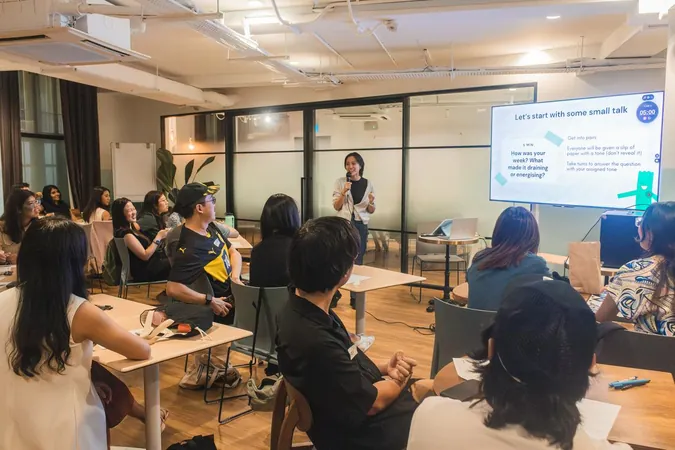
Young Singaporeans Are Embracing a Unique Course to Enhance Their Conversational Skills
2025-07-13
Author: John Tan
Why Young Adults Are Learning How to Talk
SINGAPORE – Meet Ms. Faith Tay, a 31-year-old IT professional whose experience during a Zoom meeting drastically changed her life. In the midst of presenting a new project, she found herself paralyzed by silence as fear gripped her. With her heart racing and breath shallow, she couldn’t utter a word. That meeting, during the pandemic, marked a pivotal moment in her journey.
Determined to overcome her social anxiety, Faith left her job to pursue a part-time degree in IT and business. "I refuse to let my conversations dwindle or feel overwhelmed by talking to my boss. I want to connect authentically with new friends," she expressed.
Enter the School of Yapping: A Lifesaver for Socially Anxious Young Adults
Faith is among the 33 participants enrolled in the School of Yapping, a four-part workshop created specifically for young adults aged 20 to 35. Launched in June by the local social enterprise Friendzone, this $120 course aims to rebuild confidence in everyday conversations through interactive role play and real-world scenarios.
The workshop covers making small talk, understanding social cues, initiating respectful discussions, and transforming acquaintances into lasting relationships. Additionally, attendees receive personalized feedback highlighting their strengths and growth areas.
Friendzone, co-founded by Mr. Tham Jun Han, recognized an alarming trend: increasing difficulty among young people to engage socially. He explained, "After the pandemic, we saw a significant rise in participants struggling with social interaction. Many would rather bury themselves in their phones than engage in meaningful conversations."
The Rise of Social Isolation: A Reality Check
Statistics reveal a concerning reality. A 2024 survey by the Institute of Policy Studies highlighted that young adults aged 21 to 34 experience social isolation at the highest rates across all age groups. Over half reported anxiety about real-life interactions, leaning instead towards digital communication where they can feel less judged.
Wishing to improve his conversational skills, 27-year-old algorithm engineer Vishal Bajpe confessed, "As an introvert, I find it challenging to converse with strangers and build connections. Sometimes, I desire nothing more than to retreat into my comfort zone and remain silent."
Experts Weigh In: The Downside of Digital Communication
Mental health professionals emphasize a worsening trend in social confidence among youth. Dr. Lim Boon Leng pointed out that many young adults feel drained and hesitant to engage face-to-face, often spiraling into anxiety over being judged. Dr. Annabelle Chow underscored how digital communication has led to discomfort with non-verbal cues, like maintaining eye contact, resulting in a generation overly reliant on smartphones to cope.
"Real relationships thrive on shared experiences and emotional connections, but when communication predominantly occurs through screens, we miss vital opportunities to develop these skills," she said.
The Path to Recovery: Rebuilding Social Skills
To tackle these challenges, experts recommend exposure therapy and cognitive behavioral therapy to help young adults regain confidence in face-to-face interactions. Gradually stepping into social situations and reframing anxious thoughts are key steps toward re-establishing a sense of normalcy.
As Friendzone prepares to offer more courses in the future, the increasing interest in the School of Yapping proves one thing: young Singaporeans are ready to break free from their digital comfort zones and embrace real-world conversations.





 Brasil (PT)
Brasil (PT)
 Canada (EN)
Canada (EN)
 Chile (ES)
Chile (ES)
 Česko (CS)
Česko (CS)
 대한민국 (KO)
대한민국 (KO)
 España (ES)
España (ES)
 France (FR)
France (FR)
 Hong Kong (EN)
Hong Kong (EN)
 Italia (IT)
Italia (IT)
 日本 (JA)
日本 (JA)
 Magyarország (HU)
Magyarország (HU)
 Norge (NO)
Norge (NO)
 Polska (PL)
Polska (PL)
 Schweiz (DE)
Schweiz (DE)
 Singapore (EN)
Singapore (EN)
 Sverige (SV)
Sverige (SV)
 Suomi (FI)
Suomi (FI)
 Türkiye (TR)
Türkiye (TR)
 الإمارات العربية المتحدة (AR)
الإمارات العربية المتحدة (AR)